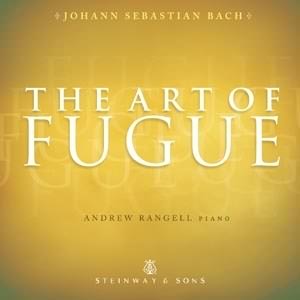It’s no more than a couple of bars into the Art of Fugue’s first Contrapunctus when Andrew Rangell’s mannerisms begin, with a tenuto here, a tenuto there, a coy diminuendo marking the second part of a fugue subject (No. 5, for example), beginning a subject with a broken octave rather than a single note (No. 6), plus a curious blend of contrapuntal clarity and overpedalling. It’s one thing not to play hands together, but quite another to do it as often as Rangell does. After a while, Rangell’s bag of tricks becomes predictable.
When he works too hard to be “expressive” the rhythmic hiccups hurt; sample No. 9’s fussy trills to hear what I mean. More’s the pity, for Rangell can play straight as a pin when he chooses to, as in the up-tempo, imaginatively voiced No. 4, or the strong, animated Canon in Augmentation and Contrary Motion (many pianists play this piece way too slowly). To be fair, Rangell’s tempo modifications make sense when underscoring dense chromatic movement in No. 11’s last section, and in the final fugue’s episode based on the musical notes that spell Bach’s name. And Rangell’s technique particularly shines in the three-voice mirror fugues, which are quite difficult to execute with two hands. In any event, this release further enhances Andrew Rangell’s reputation as a strong, often willful, sometimes illuminating, and perpetually inconsistent artist. For The Art of Fugue on piano, Evgeni Koroliov’s superb control, concentration, and commitment remains a point of reference, along with Charles Rosen’s classic 1967 recording.
































